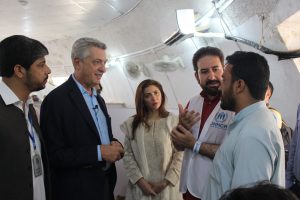
The United Nations High Commissioner for Refugees Filippo Grandi speaking with a returning family at the Voluntary Repatriation Centre in Nowshera. Renowned actress, Mahira khan is also present. (c) UNHCR/Asif Shahzad
Joint Communique: Issued by the UN High Commissioner for Refugees, Mr. Filippo Grandi and the Ministry of States and Frontier Regions on the occasion of the UN High Commissioner’s visit to Pakistan
8 September 2018
- This Communique is being issued in pursuance of the High Commissioner’s meetings with the representatives of the Government of Pakistan, notably the Prime Minister, the Minister of Foreign Affairs, the Foreign Secretary and the Secretary SAFRON.
- The High Commissioner acknowledged the hospitality of the Government and people of Pakistan in having generously hosted one of the world’s largest protracted refugee situations for nearly four decades. He highlighted the important contribution that Pakistan’s generosity has continued to make to regional stability (including in the context of the challenging situation in Afghanistan), but also more broadly to the refugee cause. In this regard, the High Commissioner appreciated the unique relationship between the Government of Pakistan and UNHCR which provided important experiences and the development of best practices globally.

The United Nations High Commissioner for Refugees Filippo Grandi speaking with a returning family at the Voluntary Repatriation Centre in Nowshera. Renowned actress, Mahira Khan is also present. (c) UNHCR/Asif Shahzad
- The Government of Pakistan encouraged robust development projects in Afghanistan, particularly in the potential areas of return for sustainable repatriation with ensured practicality and implementation details to incentivize the returnees. The Government of Pakistan also highlighted the imperative need for including the voluntary returnees in the overall resolution of the Afghan conflict and development plans in Afghanistan and would help in sustainable reintegration of returnees.
- The High Commissioner apprised the Government of Pakistan of his discussions with the Government of Afghanistan and commended the committment of the Government of Afghanistan, at the highest levels, to finding solutions to the long-standing displacement issues. He underlined concrete steps taken in this regard, including Afghanistan’s resolve to implement the Comprehensive Refugee Response Framework (CRRF), the increasing engagement of both humanitarian and development actors in supporting sustainable reintegration of all categories of returning Afghans, and UNHCR’s efforts to support sustainable reintegration, notably in 15 areas of high return selected jointly with the Government of Afghanistan. The High Commissioner also welcomed the important progress that has been made within the framework of the Afghanistan-Pakistan Action Plan on Peace and Solidarity (APAPPS), including the establishment of a bilateral working group on refugee returns and reintegration.
- The Government of Pakistan referred to its pro-active engagement in global discussions pertaining to the Global Compact on Refugees, its agreement to extend the SSAR+ framework for 2018-19 and its progressive implementation of the Comprehensive Policy on Voluntary Repatriation and Management of Afghan Nationals, adopted by the Federal Cabinet in 2017, including notably the recent registration of nearly 880,000 undocumented Afghans.
- The High Commissioner strongly appreciated these efforts and reiterated UNHCR’s committment to the implementation of the Global Compact on Refugees, the SSAR+ and the forward-looking Comprehensive Policy of the Government of Pakistan which recognizes the complex nature and context of mixed cross-border movements and reconciles the fundamental principles of refugee protection and migration management. In this regard, the High Commissioner commended the measures taken by the Government of Pakistan to register and document the undocumented Afghans and to work with the Government of Afghanistan in ensuring that they can obtain Afghan passports and Pakistani visas. He also encouraged the Government of Pakistan to extend the validity of the Proof of Registration (PoR) cards for Afghan refugees beyond September 2018.
- The Joint Government-UNHCR Refugee Affected and Hosting Areas (RAHA) initiative has since its launch in 2009 provided vital assistance (with a total of over USD 200 million) to 10.6 million individuals, including both Afghan refugees and their Pakistani host communities. The continued and reinvigorated support of the international community for RAHA is an essential demonstration of tangible burden-sharing and solidarity with Pakistan for hosting one of the world’s largest protracted refugee situations. The High Commissioner underlined that UNHCR will continue to pro-actively engage with a variety of partners and advocate for commensurate support by the international community for this purpose, in line with the central committments of the Global Compact on Refugees.
- Both the High Commissioner and the Government of Pakistan noted that traditional approaches are no longer sufficient to address the protracted Afghan displacement situation, in view of the prevailing challenges in Afghanistan. As such, and in order to maximize the impact in an environment of shrinking humanitarian resources globally, it is vital to pursue innovative solidarity approaches and joint advocacy and resource mobilization, including through various follow-up measures presented in the Global Compact on Refugees.
- The upcoming international fora, including notably the 2018 Geneva Conference on Afghanistan, will provide important opportunities to further raise the protracted Afghan refugee situation higher on the agenda of the international community, acknowledge the immense contribution and experience of Pakistan as a principal host country, and advocate for greater responsibility-sharing and support for both i) voluntary repatriation and sustainable reintegration in Afghanistan and ii) support for host communities pending return and reintegration.
Share on Facebook
Share on Twitter

